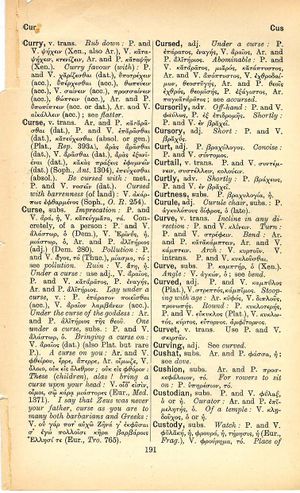curse: Difference between revisions
ἄνθρωπός ἐστι πνεῦμα καὶ σκιὰ μόνον → human being is only a breath and a shadow, man is but a breath and a shadow
(CSV3) |
m (Woodhouse1 replacement) |
||
| Line 1: | Line 1: | ||
{{Woodhouse1 | {{Woodhouse1 | ||
|Text=[[File:woodhouse_191.jpg|thumb|link={{filepath:woodhouse_191.jpg}}]] | |Text=[[File:woodhouse_191.jpg|thumb|link={{filepath:woodhouse_191.jpg}}]] | ||
===verb transitive=== | |||
Ar. and P. καταρᾶσθαι (dat.), P. and V. ἐπαρᾶσθαι (dat.), κατεύχεσθαι (absol. or gen.) ( | [[Aristophanes|Ar.]] and [[prose|P.]] [[καταρᾶσθαι]] (dat.), [[prose|P.]] and [[verse|V.]] [[ἐπαρᾶσθαι]] (dat.), [[κατεύχεσθαι]] (absol. or gen.) ([[Plato]], ''[[Republic]]'' 393A), [[ἀρὰς ἀρᾶσθαι]] (dat.), [[verse|V.]] [[ἀρᾶσθαι]] (dat.), [[ἀρὰς ἐξανιέναι]] (dat.), [[κακὰς πράξεις ἐφυμνεῖν]] (dat.) ([[Sophocles|Soph.]], ''[[Antigone]]'' 1304), [[ἐπεύχεσθαι]] (absol.). | ||
[[be cursed with]]: Met., [[prose|P.]] and [[verse|V.]] [[νοσεῖν]] (dat.). | |||
[[cursed with barrenness]] (of [[land]]): [[verse|V.]] [[ἀκάρπως ἐφθαρμένος]] ([[Sophocles|Soph.]], ''[[Oedipus Rex]]'' 254). | |||
===substantive=== | |||
[[imprecation]]: [[prose|P.]] and [[verse|V.]] [[ἀρά]], ἡ, [[verse|V.]] [[κατεύγματα]], τά. | |||
[[concretely]], of a [[person]]: [[prose|P.]] and [[verse|V.]] [[ἀλάστωρ]], ὁ ([[Demosthenes|Dem.]]), [[verse|V.]] [[Ἐρινύς]], ἡ, [[μιάστωρ]], ὁ, [[Aristophanes|Ar.]] and [[prose|P.]] [[ἀλιτήριος]] (adj.) ([[Demosthenes|Dem.]] 280). | |||
[[pollution]]: [[prose|P.]] and [[verse|V.]] [[ἄγος]], τό ([[Thucydides|Thuc.]]), [[μίασμα]], τό; see [[pollution]]. | |||
[[ruin]]: [[verse|V.]] [[ἄτη]], ἡ. | |||
[[under a curse]]: use adj., [[verse|V.]] [[ἀραῖος]], [[prose|P.]] and [[verse|V.]] [[κατάρατος]], [[prose|P.]] [[ἐναγής]], [[Aristophanes|Ar.]] and [[prose|P.]] [[ἀλιτήριος]]. | |||
[[lay under a curse]], v.: [[prose|P.]] [[ἐπάρατον ποιεῖσθαι]] (acc.), [[verse|V.]] [[ἀραῖον λαμβάνειν]] (acc.). | |||
[[under the curse of the goddess]]: [[Aristophanes|Ar.]] and [[prose|P.]] [[ἀλιτήριος τῆς θεοῦ]]. | |||
[[one under a curse]], subs.: [[prose|P.]] and [[verse|V.]] [[ἀλάστωρ]], ὁ. | |||
[[bringing a curse on]]: [[verse|V.]] [[ἀραῖος]] (dat.) (also [[Plato]] but rare [[prose|P.]]). | |||
[[a curse on you]]: [[Aristophanes|Ar.]] and [[verse|V.]] [[φθείρου]], [[ἔρρε]], [[ἄπερρε]], [[Aristophanes|Ar.]] [[οἴμωζε]], [[verse|V.]] [[ὄλοιο]], [[οὐκ εἰς ὄλεθρον]]; [[οὐκ εἰς φθόρον]]. | |||
these (children), alas! bring a curse upon your head: [[verse|V.]] οἵδ' εἰσὶν, οἴμοι, σῷ κάρᾳ μιάστορες ([[Euripides|Eur.]], ''[[Medea]]'' 1371). | |||
I say that Zeus was never your father, curse as you are to many both barbarians and Greeks: [[verse|V.]] οὐ γάρ ποτ' αὐχῶ Ζῆνά γ' ἐκφῦσαι σ' ἐγώ πολλοῖσι κῆρα βαρβάροις Ἕλλησί τε ([[Euripides|Eur.]], ''[[Troades]]'' 765). | |||
}} | }} | ||
Revision as of 08:49, 20 May 2020
English > Greek (Woodhouse)
verb transitive
Ar. and P. καταρᾶσθαι (dat.), P. and V. ἐπαρᾶσθαι (dat.), κατεύχεσθαι (absol. or gen.) (Plato, Republic 393A), ἀρὰς ἀρᾶσθαι (dat.), V. ἀρᾶσθαι (dat.), ἀρὰς ἐξανιέναι (dat.), κακὰς πράξεις ἐφυμνεῖν (dat.) (Soph., Antigone 1304), ἐπεύχεσθαι (absol.).
be cursed with: Met., P. and V. νοσεῖν (dat.).
cursed with barrenness (of land): V. ἀκάρπως ἐφθαρμένος (Soph., Oedipus Rex 254).
substantive
imprecation: P. and V. ἀρά, ἡ, V. κατεύγματα, τά.
concretely, of a person: P. and V. ἀλάστωρ, ὁ (Dem.), V. Ἐρινύς, ἡ, μιάστωρ, ὁ, Ar. and P. ἀλιτήριος (adj.) (Dem. 280).
pollution: P. and V. ἄγος, τό (Thuc.), μίασμα, τό; see pollution.
under a curse: use adj., V. ἀραῖος, P. and V. κατάρατος, P. ἐναγής, Ar. and P. ἀλιτήριος.
lay under a curse, v.: P. ἐπάρατον ποιεῖσθαι (acc.), V. ἀραῖον λαμβάνειν (acc.).
under the curse of the goddess: Ar. and P. ἀλιτήριος τῆς θεοῦ.
one under a curse, subs.: P. and V. ἀλάστωρ, ὁ.
bringing a curse on: V. ἀραῖος (dat.) (also Plato but rare P.).
a curse on you: Ar. and V. φθείρου, ἔρρε, ἄπερρε, Ar. οἴμωζε, V. ὄλοιο, οὐκ εἰς ὄλεθρον; οὐκ εἰς φθόρον.
these (children), alas! bring a curse upon your head: V. οἵδ' εἰσὶν, οἴμοι, σῷ κάρᾳ μιάστορες (Eur., Medea 1371).
I say that Zeus was never your father, curse as you are to many both barbarians and Greeks: V. οὐ γάρ ποτ' αὐχῶ Ζῆνά γ' ἐκφῦσαι σ' ἐγώ πολλοῖσι κῆρα βαρβάροις Ἕλλησί τε (Eur., Troades 765).

